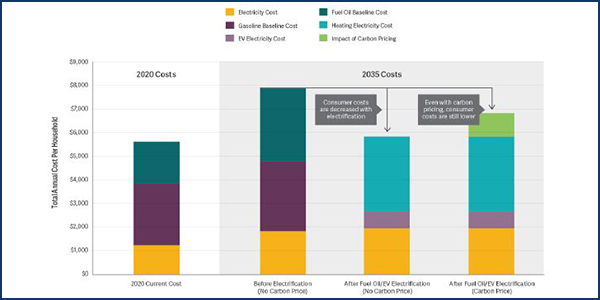Connecticut Department of Energy and Environmental Protection Commissioner Katie Dykes took aim at both ISO-NE and FERC in a panel discussion on carbon pricing in wholesale electricity markets at Thursday’s Consumer Liaison Group video meeting.
Dykes said she opposes the RTO’s proposal to add a carbon price on top of the Regional Greenhouse Gas Initiative (RGGI), which sets the cap for carbon emissions across New England.
“Our states in New England, participating in RGGI as we do, have sent multiple letters to ISO New England and to [the New England Power Pool] regarding carbon pricing,” Dykes said. “And essentially, repeatedly we’ve had to go on record, stating that we are not in support of a carbon adder as a supplement or perhaps as a replacement for the RGGI program.”
Dykes, who served as chair of the Connecticut Public Utilities Regulatory Authority from 2015 to 2018 and RGGI board of directors chair from 2014 to 2017, noted that states also contract for grid-scale renewables and back utility-administered investments in energy efficiency.
“Overall, those programs, in compliment with the RGGI program, have contributed to achieving significant reductions in carbon emissions in our state at a relatively low cost to families and businesses,” Dykes said.
RGGI’s strengths are that it is governed by state commissioners, Dykes said, which means program designs align with individual states’ policies, and it provides for reinvestment of proceeds from the sale of allowances.
“Those reinvestments are flowing back into energy efficiency programs, which provide the greatest magnifier of benefits for our customers, not just in terms of further reducing emissions … but also helping to offset individual bills,” she said.

Estimated consumer energy costs that adopt electric vehicles and convert to electric heat pumps | Analysis Group
Asked to comment on Dykes’ remarks, an ISO-NE spokesperson said the RTO “continues to support the states as they work to develop electricity sources that are clean, reliable and cost-effective for the benefit of our region. We’ve recommended carbon pricing as a simple, cost-effective and transparent solution to integrate the state’s policy goals with the wholesale electricity markets. We recognize it as just one of several ideas being discussed among the states and regional stakeholders to deliver a clean energy future for New England.”
Joseph Cavicchi, vice president of Analysis Group, gave the Consumer Liaison Group a presentation on his company’s report on carbon pricing for the New England Power Generators Association (NEPGA). He agreed with Dykes for the “need to be cognizant of the costs that would be incurred by consumers” if carbon pricing pushed up not only electricity prices, but also increased the cost of gasoline, natural gas and oil as well. Cavicchi said progressively increasing the price on carbon emissions can support market-based investment in “clean energy technologies.”
“If you had a carbon price that translated to $25 to $35/short ton in 2025, upwards to $55 to $70/short ton in 2030 and 2035, you’d go a long way toward supporting the kinds of investments that we think are necessary,” Cavicchi said.
‘Tragic’ Disconnect
During the panel’s question-and-answer session, Dykes fielded a question from an attendee who referenced FERC’s Sept. 4 ruling rejecting NYISO’s proposal to make it easier for public policy resources to clear its capacity market. (See FERC Rejects NYISO Bid to Aid Public Policy Resources.)
Dykes said that FERC is challenging the ability of states to rely on competitive markets to achieve decarbonization goals. That is “really the tragedy of this disconnect between the federal policies and in states continuing to address the need to mitigate carbon emissions,” she said.
She also said it concerned her that no state regulators were invited to speak at FERC’s Sept. 30 technical conference on carbon pricing in the wholesale electricity markets. (See FERC Announces Tech Conferences on Carbon, OSW.) ISO-NE CEO Gordon van Welie and Matthew White, chief economist for the RTO, are scheduled to be panelists.
“We look forward to sharing our perspectives,” the RTO spokesperson said of the conference. “The New England states play an important role in evaluating potential solutions, and we fully recognize that any solution for carbon reduction in our region, such as carbon pricing, requires a coordinated effort with state policymakers.”
Boston Climate Action Plan
John Cleveland, executive director of the Boston Green Ribbon Commission, a group of stakeholders working to implement the city’s Climate Action Plan, gave a presentation on the group’s work and the 2019 update of the climate plan, which highlights the steps the city will take over the next five years toward achieving carbon neutrality by 2050.
Cleveland emphasized the need for a “comprehensive and integrated approach,” including reducing energy demand and maximizing energy efficiency; electrification of transportation and heating; and a transition to greenhouse gas-free fuels. “There is no silver bullet,” he said.
As next steps, he urged the RTO to engage stakeholders to reach consensus, “reinvigorate” the Integrating Markets and Public Policy Initiative, invest in the Future of the Grid analysis and develop a decarbonization “pathways” analysis with options including carbon pricing.
ISO-NE Update
Eric Johnson, ISO-NE’s director of external affairs, gave the group an update on activities in the RTO, including the impact of COVID-19 on power demand, the RTO’s proposed 2021 budget and preparations for Forward Capacity Auction 15.
He said the RTO’s latest Electric Generator Air Emissions Report showed carbon dioxide emissions dropped by 31% during the 10-year period of 2009 to 2018. Nitrogen oxide emissions decreased by 43% and sulfur dioxide emissions plunged 94% over the same period, he said.



